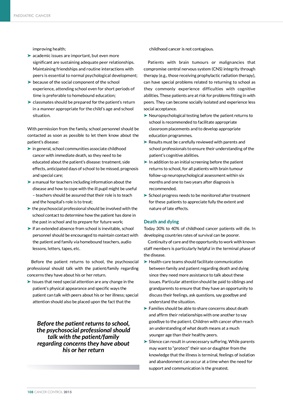
improving health;
‰ academic issues are important, but even more
significant are sustaining adequate peer relationships.
Maintaining friendships and routine interactions with
peers is essential to normal psychological development;
‰ because of the social component of the school
experience, attending school even for short periods of
time is preferable to homebound education;
‰ classmates should be prepared for the patient's return
in a manner appropriate for the child's age and school
situation.
With permission from the family, school personnel should be
contacted as soon as possible to let them know about the
patient's disease:
‰ in general, school communities associate childhood
cancer with immediate death, so they need to be
educated about the patient's disease: treatment, side
effects, anticipated days of school to be missed, prognosis
and special care;
‰ a manual for teachers including information about the
disease and how to cope with the ill pupil might be useful
- teachers should be assured that their role is to teach
and the hospital's role is to treat;
‰ the psychosocial professional should be involved with the
school contact to determine how the patient has done in
the past in school and to prepare for future work;
‰ if an extended absence from school is inevitable, school
personnel should be encouraged to maintain contact with
the patient and family via homebound teachers, audio
lessons, letters, tapes, etc.
Before the patient returns to school, the psychosocial
professional should talk with the patient/family regarding
concerns they have about his or her return.
‰ Issues that need special attention are any change in the
patient's physical appearance and specific ways the
patient can talk with peers about his or her illness; special
attention should also be placed upon the fact that the
PAEDIATRIC CANCER
108 CANCER CONTROL 2015
Before the patient returns to school,
the psychosocial professional should
talk with the patient/family
regarding concerns they have about
his or her return
childhood cancer is not contagious.
Patients with brain tumours or malignancies that
compromise central nervous system (CNS) integrity through
therapy (e.g., those receiving prophylactic radiation therapy),
can have special problems related to returning to school as
they commonly experience difficulties with cognitive
abilities. These patients are at risk for problems fitting in with
peers. They can become socially isolated and experience less
social acceptance.
‰ Neuropsychological testing before the patient returns to
school is recommended to facilitate appropriate
classroom placements and to develop appropriate
education programmes.
‰ Results must be carefully reviewed with parents and
school professionals to ensure their understanding of the
patient's cognitive abilities.
‰ In addition to an initial screening before the patient
returns to school, for all patients with brain tumour
follow-up neuropsychological assessment within six
months and one to two years after diagnosis is
recommended.
‰ School progress needs to be monitored after treatment
for these patients to appreciate fully the extent and
nature of late effects.
Death and dying
Today 30% to 40% of childhood cancer patients will die. In
developing countries rates of survival can be poorer.
Continuity of care and the opportunity to work with known
staff members is particularly helpful in the terminal phase of
the disease.
‰ Health-care teams should facilitate communication
between family and patient regarding death and dying
since they need more assistance to talk about these
issues. Particular attention should be paid to siblings and
grandparents to ensure that they have an opportunity to
discuss their feelings, ask questions, say goodbye and
understand the situation.
‰ Families should be able to share concerns about death
and affirm their relationships with one another to say
goodbye to the patient. Children with cancer often reach
an understanding of what death means at a much
younger age than their healthy peers.
‰ Silence can result in unnecessary suffering. While parents
may want to "protect" their son or daughter from the
knowledge that the illness is terminal, feelings of isolation
and abandonment can occur at a time when the need for
support and communication is the greatest.